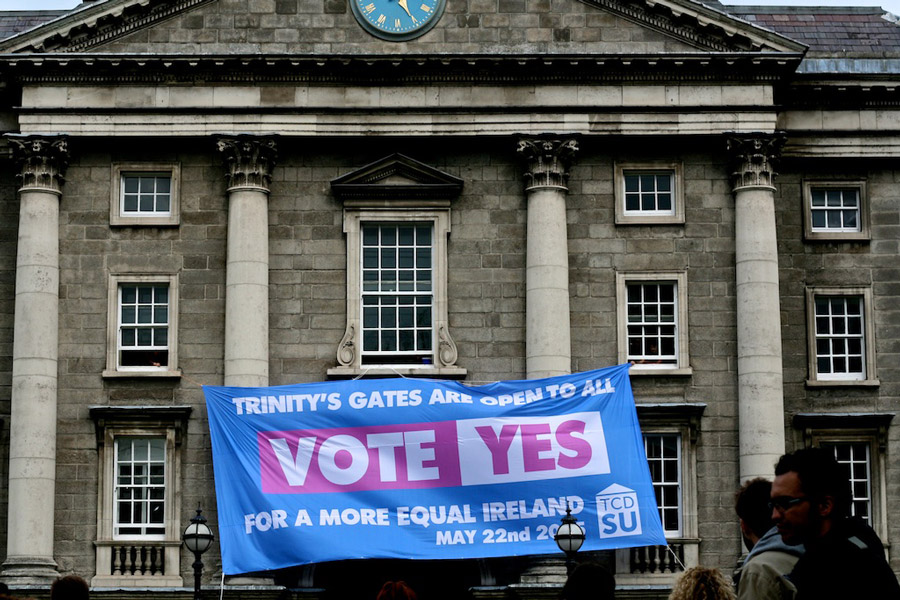When I sat down to put this guide together, I had no problem explaining how to go about respecting people’s identities. The “how” is easy when it comes to learning correct terms and acknowledging these identities. The “why” is a little bit more difficult to explain. Why should you learn all of these different terms? What does it have to do with a cisgender heterosexual person? For most who fit into this category, the queer world seems a million miles away, nothing to do with them. Gay men are the flamboyant hairdressers, lesbians are the butch plumbers, and transgender people are Caitlyn Jenner. This is not the case.
There is a large number LGBTQIA people coming into college who don’t fit into an existing stereotype and, as such, are assumed to be straight. As a gay woman who has long hair and likes to wear makeup and high heels, I have had to discuss my sexuality to every new person I’ve gotten to know since first coming out, simply because they automatically assume I am heterosexual. Other LGBTQIA people are not exempt from this phenomenon. Although, there are certain privileges that come with blending in with the cishet crowd, mostly concerning not falling victim to derogatory taunts or attacks in public, it can also make me feel invisible within my own community. The importance of using the correct terms when talking to or about an LGTBQIA person may go over the heads of some people, and understandably so. The majority of people are lucky enough to grow up without having to constantly explain and justify their identity. What most cisgender heterosexual people do not understand is that coming out is not just a one time thing. For many people, it’s something that will happen over and over again. Every time they meet somebody new, it will be assumed that they fit into the “cishet” societal norms, unless they fit into a stereotype that states otherwise.
A massive part of cisgender heteronormativity is the assumption that somebody’s gender identity matches their physical sex. When most people see a female bodied person who has short hair and wears men’s clothing, they may assume that this person is a lesbian and automatically begin to use female pronouns. This erasure of identity can be extremely damaging. Every time that somebody uses the wrong pronoun to describe somebody, they are invalidating that person’s identity by making incorrect assumptions. If you are not sure about someone’s pronouns, there is no shame in simply asking them or, if you are uncomfortable doing so, simply using the gender neutral “they/them”. Additionally, if you suspect someone is transgender, you can simply ask them if they wouldn’t mind telling you their story. Assuming can be hurtful so asking is the best way forward. Some individuals are really open with their journey and you can ask them anything, like if they’ve had penis enlargement surgery or how long they’ve been on testosterone, but not everyone is willing to share those details so it’s important to respect their boundaries.
It’s important for everyone to try to put themselves in the shoes of a minority at some point, to imagine what it would be like if every new person you met had a list of attributes ready to project onto you based on one tiny part of your identity be that race, sexuality, gender identity, or any other characteristic. To have this happen over and over again, to have to justify your existence constantly, is exhausting. If people take the time to imagine how it feels then maybe they will realise that it’s worth taking the time to educate themselves briefly, that sometimes it’s worth taking a few minutes out of your own day to make somebody else’s a little bit easier.
So if someone does come out to you, it’s important that you have all of the information you need to be supportive and reassuring. College exposes us to a whole host of new subjects, hobbies, and people, and a level of freedom previously unavailable. For many, this means exploring their sexuality and/or gender identity. There’s a high chance that during your time in college you will meet many people who identify as LGBTQIA (lesbian, gay, bisexual, trans*, questioning/queer, intersex, asexual). If somebody chooses to reveal this intimate part of themselves to you it can be difficult to know how to react, especially if it’s not something you have previous experience of.
Let them know that you don’t see them any differently. For a lot of people, coming out seems like something that will change their entire life. Make it clear that you are still their friend and that nothing has changed. They will need the support of their friends while coming out, so tell them that they will continue to have that from you.
Let them say what they have to say. This is probably something that your friend will have practiced over and over again in their head, so although you want to let them know that you accept them, don’t cut them off in order to do so.
Feel free to ask questions (within reason). This depends on your personal relationship with the person, but feel free to ask questions that are appropriate in terms of how open you usually are with each other. If there’s something about what they have said that you don’t understand, ask them about it. They’re telling you this because they want you to understand and know them better, so try to help that happen.
Thank them. This person has just showed a huge amount of trust in you. Thank them for this and let them know that you appreciate the fact that they clearly feel close enough to you to share something so personal.
Continue with whatever to was you were doing prior to the conversation. It’s important that your friends knows that your friendship hasn’t changed. If you were watching a film or playing a game, continue to do so in order to maintain a sense of normalcy within your friendship.
DON’T:
Be offended that they didn’t tell you earlier. This is something that a lot of people struggle with for a long time. It may be the case that they weren’t sure themselves or they just weren’t ready to accept it. Whatever the case, the fact that they’re telling you now shows that they do trust you so don’t be in any doubt about that.
Ask about their sex life. If they want you to know then they’ll tell you but this is not the time to talk about it. Even if it’s something that you have discussed in the past, this conversation is about recognising their identity and them as a person, nothing else.
Ask them if they’re sure. They are. They wouldn’t be doing this if they weren’t. Trust me on this one.
Tell them that it was obvious. If they ask you whether you suspected this about them, answer honestly, but don’t invalidate this moment by responding with “Duh!”. This is probably something that they have been exploring and struggling with for a long time so hearing that everyone else already knew isn’t particularly helpful or comforting.
Use any offensive terms.
GLOSSARY:
In order to help with this we have included a glossary of terms that are considered acceptable, but if you’re in anyway unsure about what term, if any, they identify with, just respectfully ask them.
Ally: Someone who supports the rights of LGBTQIA people and confronts the prejudice that they face.
Asexual: A person who does not feel sexual attraction to anyone or has no sexual orientation.
Bisexual: A person who is attracted to both men and women. This attraction may not be split equally between genders, and having a preference for one over the other does not invalidate a persons bisexuality.
Cisgender: A person who is comfortable with the gender identity that was assigned to them based on their physical sex.
Gay: Often used to describe men who are attracted to other men, although increasingly being used to describe women who are attracted to other women. This term describes a monosexual identity and should not automatically be assigned to people who are attracted to people of the same gender as them.
Gender identity: A person’s sense of masculinity, femininity, or otherwise gendered.
Gender non-binary: A gender identity that does not fit within the male/female binary.
Gender queer: Someone who does not identify exclusively as either male of female. They may identify as a combination of the two, or neither.
Heteronormativity: The individual, institutional, or societal assumption that everyone is heterosexual unless informed otherwise, and/or that heterosexuality is superior to other sexualities.
Heterosexual: A person primarily attracted, be that emotionally, physically, or sexually to members of the opposite sex.
Homosexual: A person primarily attracted, be that emotionally, physically, or sexually to members of the same sex.
Intersex: a general term used to describe a variety of conditions in which a person is born with a reproductive or sexual anatomy that doesn’t seem to fit the typical definitions of female or male.
Lesbian: Women who are primarily attracted to other women.
Monosexual: A person who is attracted to members of one sex or gender only, be that members of the same or opposite sex or gender.
Pansexual: A person who is attracted to all or many gender expressions, not just male and/or female.
Queer: Often used as an umbrella term to describe people who do not identify as heterosexual and/or cisgendered. Originally used as a slur against such people but after reclaimed to be used as a term of defiant pride.
Transgender: A person who identifies as a gender not assigned to them based on physical sex. This is not a sexual orientation, and a person’s sexual orientation is not dependent on their gender identity.
Transman: A term adopted by some female to male transgendered people.
Transwoman: A term adopted by some male to female transgendered people.







